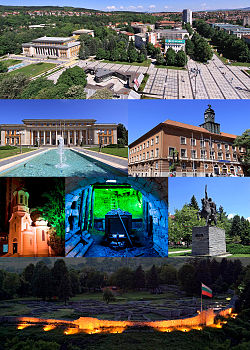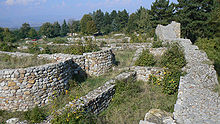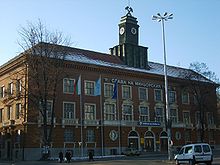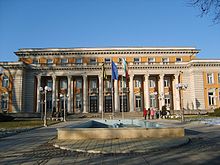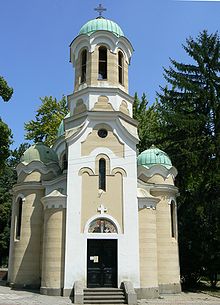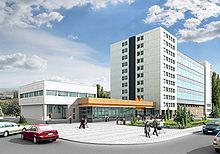- Pernik
-
Pernik
Перник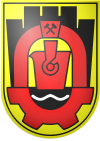
Coat of armsLocation of Pernik Coordinates: 42°36′N 23°02′E / 42.6°N 23.033°ECoordinates: 42°36′N 23°02′E / 42.6°N 23.033°E Country Bulgaria Province
(Oblast)Pernik Government – Mayor Rosica Ianakieva Elevation 710 m (2,329 ft) Population (Census February 2011)[1] – City 81,052 – Urban 97,602 Time zone EET (UTC+2) – Summer (DST) EEST (UTC+3) Postal Code 2300 Area code(s) 076 Pernik (Bulgarian: Перник) is a city in western Bulgaria (around 30 km south-west of Sofia) with a population of 81,052 as of 2011[update]. It is the main city of Pernik Province and lies on both banks of the Struma River in the Pernik Valley between the Viskyar, Vitosha and Golo Bardo mountains.
Originally the site of a Thracian fortress founded in the 4th century BC, and later a Roman settlement, Pernik became part of the Bulgarian Empire in the early 9th century as an important fortress. The name Pernik is thought to have originated from that of Slavic god Perun with the Slavic placename suffix –nik (or –ik) added, and was first mentioned in the 9th century. The medieval town was a key Bulgarian stronghold during Bulgarian tsar Samuil's wars against the Byzantine Empire in the 11th century, when it was governed by the local noble Krakra of Pernik, withstanding Byzantine sieges a number of times.
From 1396 until 1878 the city was under Ottoman rule. In the 20th century Pernik developed rapidly as a centre for coal mining and heavy industry. During the Communist rule of Bulgaria it was called Dimitrovo between 1949 and 1962 after Bulgarian Communist leader Georgi Dimitrov. The Surva International Festival of the Masquerade Games is held in the city every January. Pernik has two football teams, PFC Minyor Pernik and FC Metalurg.
Contents
History
Pernik is a successor of the medieval town of Krakra. In the 4th century the Thracians built a fortress there. There is a rich collection of archaeological findings that evidence the existence of a Thracian settlement in the late Neolithic. The richest collection of pottery in the Central Balkans dates from that time. It is kept in the Historical Museum.
A wonderful exhibition of relieves and sculptures is kept there, dedicated to the health-giving gods Asclepius and Hygieia, held in reverence in this region because of the presence of mineral springs.
Bulgarians took advantage of the fortified spot and built one of the mightiest Bulgarian strongholds — Pernik. This name was first mentioned in the 9th century. It is associated with the Slavic god Perun. At the beginning of the 11th century the settlement was a fortress, impenetrable to the Byzantines. It was the seat of the legendary governor Krakra of Pernik, who played an important role in the time of the First Bulgarian Empire.
Today, the fortress is one of the greatest historical sites of the city. In the time of the Ottoman occupation Pernik lost its significance as a fortress because it was located deep in the interior of the Empire. Until after the Liberation of Bulgaria Pernik was a small stockbreeding village, consisting of several scattered hamlets.
The beginning of Pernik's modern history is set in the 20th century with the development of the rich coal-beds of the region. According to some scientists, the existence of coal was already known in the 10th and 11th centuries. Before their industrial exploitation started, the local people dug it up with picks and shovels and transported coal with carts and wheelbarrows. Pernik's rapid development is associated with the large shipments of coal to the capital city, intended for household needs and for the railroad transport. Until then, coal for the railroads and the river and sea steamboats was delivered from as far as Cardiff in the United Kingdom.
As the first miners' quarters were built on the terraces of the Struma River, the beginning of the miners' settlement of Pernik was set, one kilometre to the east of the village of the same name. It is a town since 1929, and since 1958 — a regional centre. The coal output reached its apogee at that time. Pernik has been an energy centre of Bulgaria for a few decades.
Landmarks
- Palace of Culture
- History Museum
- Mining Museum
- Krakra's stronghold
- Duhlata cave
- Church of St John of Rila
Famous natives
- Georgi Dimitrov, politician
- Georgi Parvanov, president of Bulgaria
- Velizar Dimitrov, football player
- Zdravka Evtimova, writer
- Romel Ivanov, athlete, national champion 1500m., 800m.
- Valentin Khristov, athlete, weightlifting 1980 Olympics silver medallist
Education
The first Bulgarian private technical university was established in 2010 in Pernik. The university was founded in close cooperation with nationally-established industry partners. The European Polytechnical University offers Bachelor, Masters and PhD degrees in architecture, engineering and entrepreneurship among others. The university is aiming internationally and offers all courses bilingually in Bulgarian and English languages.[1]
Commerce
- Office Building "Elena"
- Hypermarket Billa 2 stores
- Hypermarket Kaufland 1 store
- Supermarket CBA 3 stores
- Supermarket T-market 2 stores
- Хипермаркет за бяла и черна техника „Технокомерс“ 3 stores
- a shopping mall is being built to host famous and international brands.[2]
Sport
The town is home to the Minyor Pernik football team, who play in the Bulgarian A Professional Football Group, as of 2008-09 season.
Municipality
Pernik is the seat of the eponymous Pernik municipality (part of Pernik Province), which includes the following 24 places (towns in bold):
- Batanovtsi
- Bogdanovdol
- Bosnek
- Cherna Gora
- Chuypetlovo
- Divotino
- Dragichevo
- Golemo Buchino
- Kladnitsa
- Kralev Dol
- Leskovets
- Lyulin
- Meshtitsa
- Pernik
- Planinitsa
- Raduy
- Rasnik
- Rudartsi
- Selishten Dol
- Studena
- Viskyar
- Vitanovtsi
- Yardzhilovtsi
- Zidartsi
Town twinning
Pernik is twinned with:
 Ovar, Portugal[3]
Ovar, Portugal[3] Elektrostal, Russia[3]
Elektrostal, Russia[3] Pardubice, Czech Republic[3]
Pardubice, Czech Republic[3] Luhansk, Ukraine[3]
Luhansk, Ukraine[3] Balashikha, Russia[3]
Balashikha, Russia[3] Kavadarci, Republic of Macedonia[3]
Kavadarci, Republic of Macedonia[3] Lublin, Poland[3]
Lublin, Poland[3] Rožaje, Montenegro[3]
Rožaje, Montenegro[3] Nilüfer district of Bursa, Turkey[3]
Nilüfer district of Bursa, Turkey[3] Orsha, Belarus[3]
Orsha, Belarus[3] Orosei municipality, Province of Nuoro, Italy[3]
Orosei municipality, Province of Nuoro, Italy[3] Caen, France
Caen, France
Honour
Pernik Peninsula in Graham Land, Antarctica is named after the city of Pernik.
Gallery
References
- ^ "European Polytechnical University". epu.bg. http://epu.bg/pages/en/aboutus. Retrieved 2010-08-22.
- ^ "Bulgaria". Novinite.com. 2010-05-21. http://188.40.98.135/~novinite/view_news.php?id=116422. Retrieved 2010-10-06.
- ^ a b c d e f g h i j k Twin cities list on the official municipality website - www.pernik.bg
External links
- Pernik Info
- Pernik Business directory
- Discussion board
- Pernik municipality website
- Pernik.net
- The Surva International Festival of the Masquerade Games in the city of Pernik
- Pictures from Surva International Festival
- zona pernik / Зона Перник
Breznik · Kovachevtsi · Pernik · Radomir · Tran · Zemen
Categories:- Populated places established in the 4th century BC
- Populated places in Bulgaria
- Pernik Province
- Pernik
Wikimedia Foundation. 2010.

